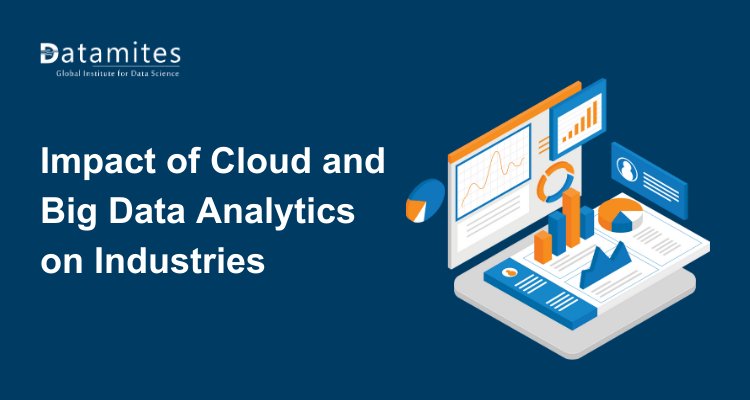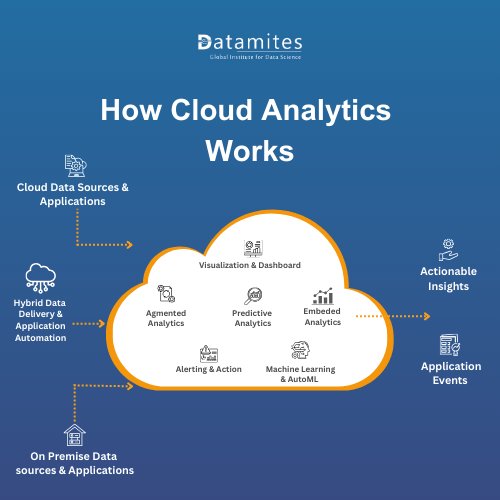Impact of Cloud Computing and Big Data Analytics on Industries
Explore how Cloud Computing and Big Data Analytics transform industries like healthcare, retail, finance, manufacturing, and logistics with real-time insights, predictive analytics, and optimized processes for smarter, data-driven decisions.

In today’s digital-first world, businesses generate enormous volumes of data every second. From customer behavior to operational metrics, the ability to process, analyze, and act upon this information has become a defining factor in competitiveness.
By combining scalability, flexibility, and real-time processing, cloud platforms empower organizations to unlock meaningful insights and drive innovation across industries. This is where Cloud Computing and Big Data Analytics play a transformative role.
Role of cloud computing in big data analytics
Traditional infrastructures often fall short when it comes to handling massive, complex datasets. Cloud computing in big data analytics addresses this challenge by providing on-demand resources, elastic storage, and scalable computing power. Organizations can now store terabytes or even petabytes of data without worrying about infrastructure limitations, while also enabling real time analytics to make faster, data-driven decisions.
Cloud platforms also simplify ETL in data analytics (Extract, Transform, Load), allowing seamless integration of data from multiple sources into centralized systems where analytics tools can be applied. This accelerates workflows, reduces costs, and ensures more reliable insights.
The future of cloud computing and big data analytics
The future of Cloud Computing and Big Data Analytics is poised for rapid transformation, driven by emerging technologies and evolving business needs. Organizations are embracing hybrid and multi-cloud strategies for flexibility, while serverless computing rises, enabling businesses to prioritize analytics without managing complex infrastructure.
A report by Allied Market Research states that the Big Data and Business Analytics market, valued at $225.3 billion in 2023, is projected to reach $665.7 billion by 2033, growing at a CAGR of 11.6% between 2024 and 2033.
Cloud platforms integrate AI and ML for real-time analytics and automation, while rising security concerns drive enterprises to strengthen data governance, privacy measures, and compliance frameworks.
Lets have a look on how cloud analytics actually works and its process.
Refer to the articles below:
- Understanding the Ethics of Data Analytics
- 6 Innovative Ways to Leverage AI in Data Analytics
- Applications of Data Analytics in Pharma Industry
How cloud analytics works across industries
In cloud-based analytics, vendors manage infrastructure and maintenance, offering “analytics as a service” that ensures scalability, high performance, cost efficiency, and deeper business insights.
1. Data Ingestion: Data is ingested from both cloud and on-premises sources such as CRM, social media, websites, and transactional systems. This process is often automated through ETL pipelines, ensuring seamless data delivery and integration.
2. Data Storage: Once ingested, data is stored in scalable cloud warehouses like Amazon Redshift, Google BigQuery, Microsoft Azure, or Snowflake. These platforms provide secure, reliable, and elastic storage to handle large and complex datasets.
3. Data Processing: Analytics engines process the stored data to prepare it for deeper exploration and use. Advanced platforms also support hybrid delivery and automation, streamlining operations and ensuring data readiness.
4. Data Visualization & Dashboards: Cloud analytics tools transform data into dashboards, reports, and interactive visualizations for real-time decision-making. They enable users to monitor KPIs, trends, and business performance with greater clarity.
5. Advanced Analytics: Beyond reporting, leading platforms offer predictive analytics, augmented insights, machine learning, and AutoML. These capabilities help organizations forecast outcomes and embed analytics into applications.
6. Automated Actions & Insights: With intelligent integration, data analyst tools can trigger automated, data-driven actions across systems. This enables businesses to identify patterns, optimize processes, and boost efficiency, revenue, and profitability.

The CloudDefense.AI and Scopepub Reports, Cloud Computing And Big Data Analytics evolves into secure, scalable solutions; selecting the right platform ensures real-time analytics, ETL in data analytics, cloud computing for healthcare, and cloud computing in manufacturing.
Real-world applications of data analytics in industries
Cloud Computing and Big Data Analytics are transforming industries by enabling smarter, data-driven decision-making. From healthcare to logistics, organizations leverage cloud solutions to gain actionable insights and improve operational efficiency.
- Cloud in Healthcare Analytics: Cloud computing for healthcare enables real-time patient monitoring, predictive diagnostics, and personalized treatment plans. Hospitals use data analytics in healthcare to streamline operations, reduce costs, and enhance patient care. According to the Grand View Research Report, The global healthcare cloud computing market was valued at USD 19.6 billion in 2023 and is projected to reach USD 45.1 billion by 2030, growing at a CAGR of 12.7% from 2024 to 2030.
- Cloud Computing for Retail Analytics: Retailers leverage cloud computing and data analytics to track buying behaviors, optimize supply chains, and personalize marketing campaigns. Real time data analytics in retail helps predict demand spikes and prevent stockouts. The global retail cloud market size was estimated at USD 50.09 billion in 2023 and is projected to grow at a CAGR of 18.7% from 2024 to 2030.(Grand View Research Report).
- Cloud Computing in Finance: Financial institutions use cloud computing in big data analytics to detect fraud, assess credit risks, and provide better customer experiences. Real-time data analytics in finance to streams enhance security and compliance while improving investment strategies. The Future Market Insights reports that the global finance cloud market is anticipated to reach USD 128 billion by 2033, growing from USD 42 billion in 2023, at a CAGR of 11.8%.
- Cloud Computing in Manufacturing Analytics: Cloud computing in manufacturing supports predictive maintenance, process optimization, and quality control. Using data analytics in the manufacturing sector by analyzing sensor data from IoT devices, manufacturers reduce downtime and boost efficiency.
- Cloud Computing for Logistics Analytics: In logistics, cloud computing and data analytics enable route optimization, fleet tracking, and warehouse automation. Real time data analytics in logistics ensures faster deliveries and reduced operational costs. The global logistics market was valued at USD 21,550.4 million in 2024 and is projected to reach USD 46,313.9 million by 2030, growing at a CAGR of 13.9% (Grand View Research Report).
Implementing cloud computing in big data analytics with real-time analytics enables industries to optimize processes, enhance customer experiences, and drive innovation across healthcare, manufacturing, ETL workflows, and Cloud Computing and Big Data Analytics. And now we will discuss how you can choose the best platform as per the industry requirements.
Refer to the articles below:
- How much will be the Data Analytics Course Fees in Mumbai
- How to Become a Data Analyst in Mumbai
- The Future of Data Analytics in Mumbai: Trends and Opportunities
Choosing the best cloud analytics platform in industries
Selecting the right cloud analytics platform is a critical decision for organizations, as it directly impacts scalability, security, cost efficiency, and the ability to turn data into actionable insights. Gartner reports project that global spending on public cloud services will reach a remarkable $723.4 billion by 2025.
1. Scalability Requirements: The platform should easily scale up or down as business needs evolve, ensuring flexibility during peak demand. This prevents performance bottlenecks and supports long-term growth without major infrastructure changes.
2. Security Features: Robust security is essential, including encryption, access controls, and compliance with data privacy regulations. A trusted platform should also provide audit trails and multi-factor authentication to safeguard sensitive data.
3. Cost Considerations: Look for pay-as-you-go or subscription-based pricing models that fit organizational budgets. Transparent cost structures help avoid hidden expenses while optimizing return on investment.
4. Integration Capabilities: A strong platform should integrate seamlessly with ETL pipelines, existing databases, and business applications. This ensures smooth data flow, reduces silos, and enhances overall data accessibility.
5. High-Volume Processing Applications: The platform must efficiently handle massive and complex datasets without compromising speed or accuracy. This is especially critical for industries dealing with real-time analytics or big data workloads.
6. Augmented Analytics: Leading platforms offer AI-driven insights, predictive analytics, and automation to enhance decision-making. These capabilities empower organizations to move beyond descriptive analytics into proactive, strategic planning.
Choosing the right cloud analytics platform equips professionals with essential skills for data analyst career growth, while mastering these tools through Top IT courses ensures expertise in real-time analytics, data-driven decision-making, and advanced business insights.
Refer to the articles below:
- How much is the Data Analytics course fee in India
- Data Analyst Salary in India
- Data Analyst Career Scope in India
Pursuing a Data Analyst course in Mumbai or other leading cities such as Bangalore, Hyderabad, Chennai, Coimbatore, Ahmedabad, Delhi, Jaipur, Kochi, and Kolkata equips aspiring professionals with strong industry exposure, practical skills, and a robust foundation for a successful career in analytics.
DataMites Institute is recognized as a leading training provider in India, offering expert-driven top IT courses in demand including Data Science, Machine Learning, Artificial Intelligence, Python, IoT, and Data Engineering. The institute’s industry-relevant curriculum features hands-on projects, certified internships, comprehensive placement assistance, and globally acknowledged certifications accredited by IABAC and NASSCOM FutureSkills.
With the advantage of both online and offline learning options, With its strong presence across India, the institute provides Data Analyst training in Bangalore and to all major cities including Pune, Chennai, Hyderabad, Ahmedabad, Coimbatore, Mumbai, Delhi, Jaipur, Kochi, and Kolkata.
